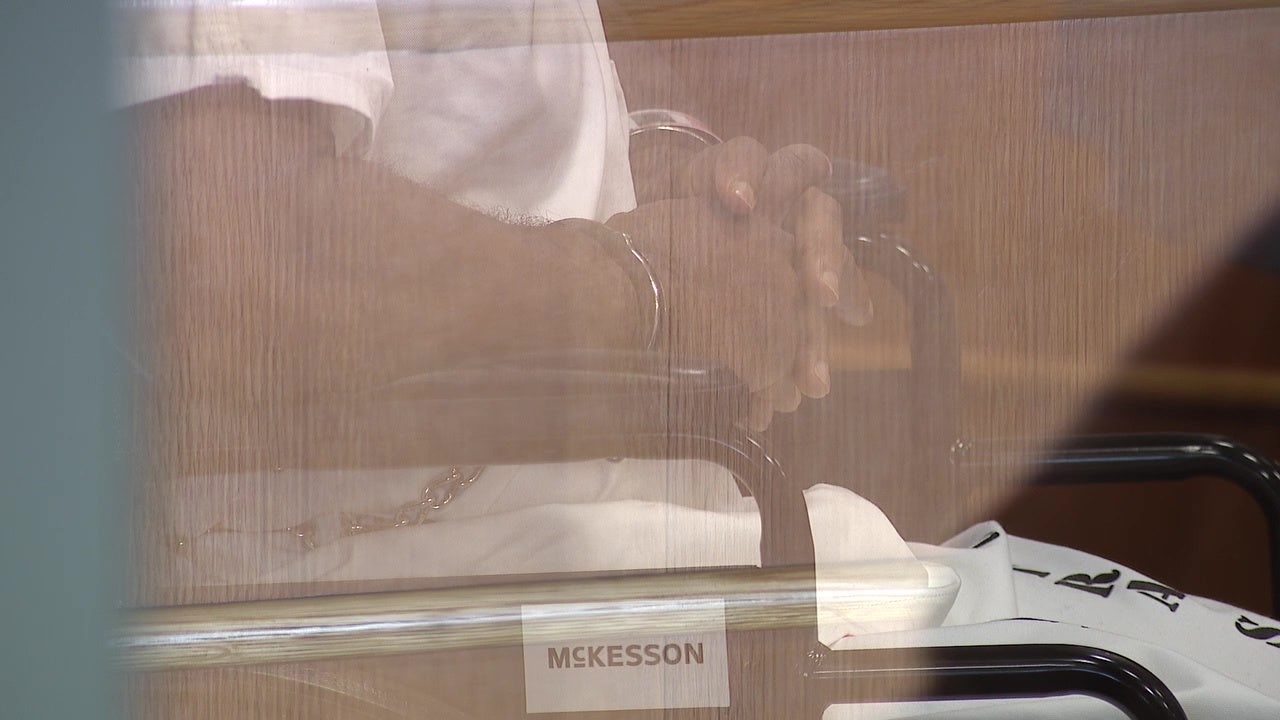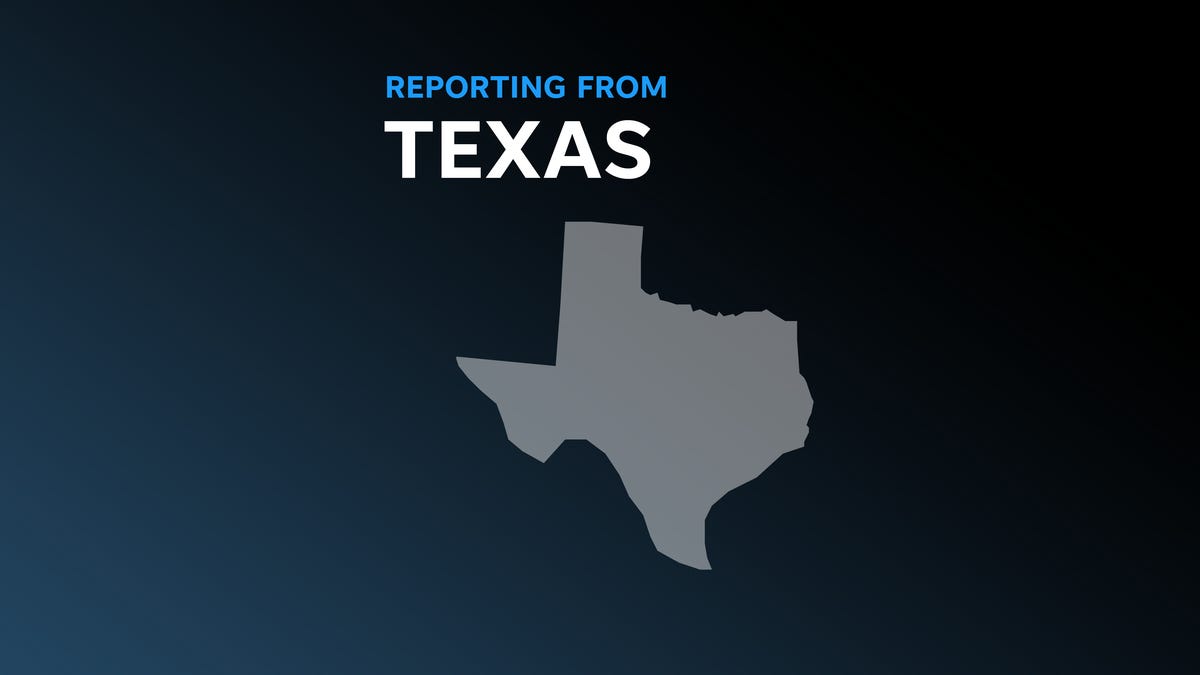World
Q&A: Canada’s anti-Islamophobia representative vows to fight hate
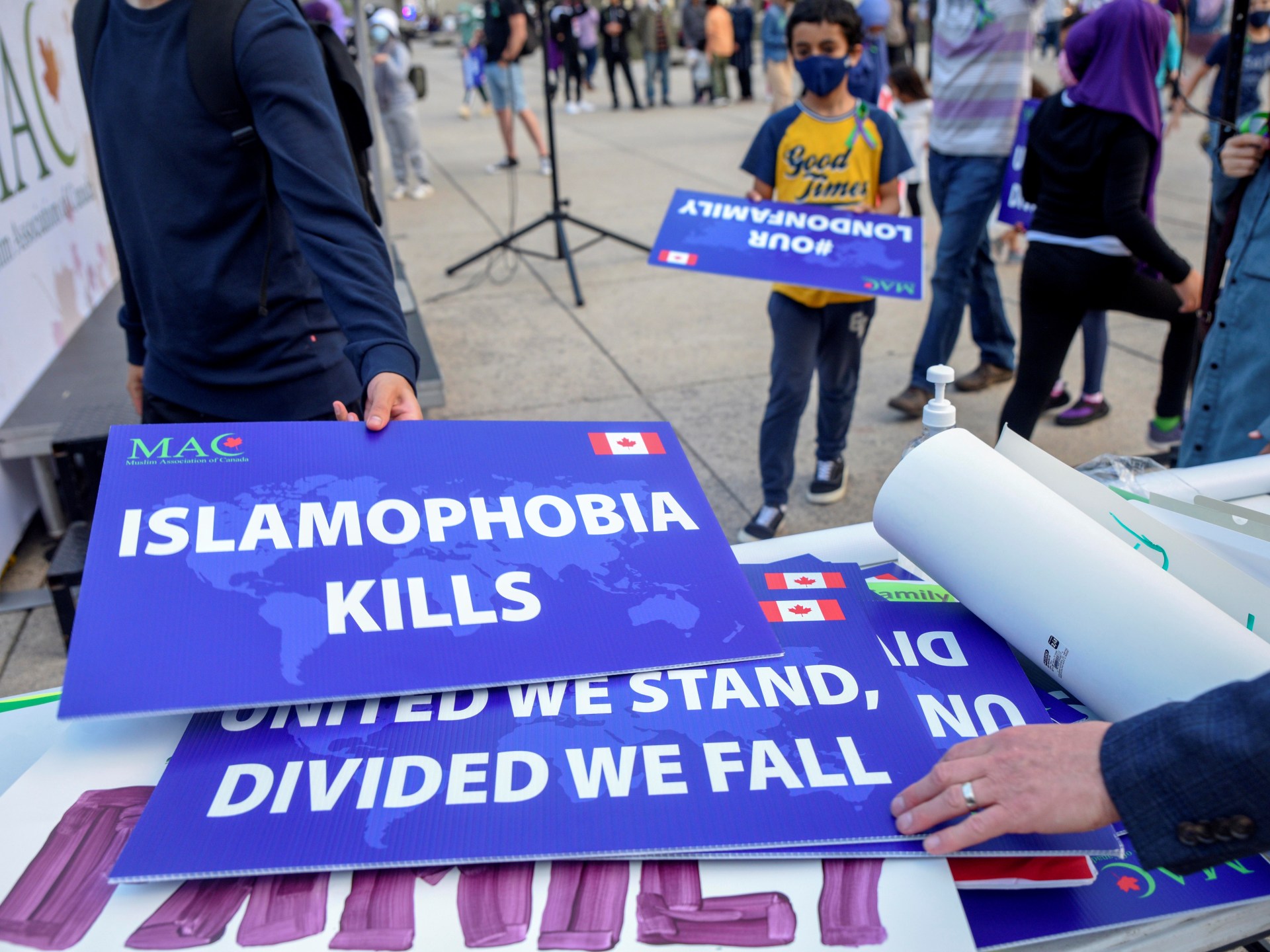
Montreal, Canada – It was a Sunday evening two years ago when an act “rooted in unspeakable hatred” changed one family forever and shook Muslim communities across Canada in the process.
The Afzaals were taking a walk in the city of London, Ontario on June 6, 2021, when a man ran them over with his truck in what authorities said was an intentional attack. Four members of the family were killed, and a young boy was seriously injured.
The deadly assault sent shock waves throughout the country, where Muslims were still reeling from a series of fatal attacks at mosques and a rise of Islamophobic rhetoric.
It also fuelled calls for action and pushed Prime Minister Justin Trudeau’s government to first establish a summit on Islamophobia and then earlier this year to name a special representative to tackle the problem.
The appointment of Amira Elghawaby in January as Canada’s first special representative on combatting Islamophobia was welcomed by Muslim community advocates. But it faced fierce criticism in the province of Quebec, where politicians called for her removal for past criticism of a law banning religious garb in the public sector that has drawn widespread accusations of racism.
Here, Al Jazeera speaks to Elghawaby about the two-year anniversary of the London attack, the state of Islamophobia in Canada today, and what her job entails.
Al Jazeera: What impact did the London attack have on Muslims in Canada?
Amira Elghawaby: I think it’s really important to note that London’s Muslim communities are still carrying the weight of what happened two years ago. It’s still quite heavy on people’s minds.
[I have been] meeting with some of the young people, in particular, who have been organising for the past two years, trying to ensure that not only the city of London, but Canadians, don’t forget what happened to this beautiful, intergenerational family that was targeted for no other reason than their Muslim faith.
There is still a lot of pain and anxiety and fear that hate is still in our communities. Especially women who are visibly Muslim, who wear the hijab [headscarf], are sometimes a little more worried about being singled out. And so I think that those sentiments are held in other communities, as well.
In the first 100 days of my office, I’ve had an opportunity to have community engagements in the top provinces where Muslims reside, so Ontario, Quebec and Alberta. While I consistently hear that Canadian Muslims are proud to be in Canada and contributing … at the same time, there are concerns about Islamophobia.
And there is hope that the Afzaal attack hopefully really galvanised people to understand that this is a type of hatred that we have to work collectively to address.
Al Jazeera: There was strong criticism of your appointment, notably from politicians from Quebec. Do you feel that you can speak out against Islamophobia in that province specifically?
Elghawaby: I have been quite clear in speaking out against Islamophobia right across Canada as a phenomenon that all of us have to come together to address.
Muslims living in different provinces experience discrimination and Islamophobia in different ways, and so I think what’s critical is for this office to continue to engage, to continue to listen, to the lived experiences of Muslims in every single part of this country.
The role is to bring those experiences forward to fellow Canadians, to the federal government, in helping to support legislation and policies that are helping to ensure the inclusion of all people in this country.
Al Jazeera: What is the state of Islamophobia in Canada right now?
Elghawaby: I think it’s very important to emphasise that many, many fellow Canadians are very committed to inclusive, warm, welcoming societies. Overall, we have values in this country, we have a democratic tradition, [and] we have a sense of pluralism and inclusion that really is part of our identity as Canadians.
But the reality is as well that, for instance, Islam is the most negatively viewed religion in Canada, according to a recent poll (PDF) by Angus Reid. Or another poll by Leger a few months ago showed that while 46 percent of Canadians do see themselves as allies to Muslim communities, there’s still a significant number who don’t.
Unfortunately for 2020 to 2021 – the most recent statistics – we’ve seen a 71-percent increase in anti-Muslim hate crimes, according to Statistics Canada. That only tells a partial story though, too, because a majority of people don’t report the hate that they experience.
We’re able to sort of piece together these statistics and these lived experiences to know that again, we certainly do have our work cut out for us.
The lives of three generations of the Afzaal family were taken in an appalling and cowardly terrorist attack two years ago. Today, we remember #OurLondonFamily – Talat, Salman, Madiha, and Yumna – and we stand with Fayez. We must, and we will, keep working to combat Islamophobia.
— Justin Trudeau (@JustinTrudeau) June 6, 2023
Al Jazeera: What can be done to address and end Islamophobia in the country?
Elghawaby: I think acknowledging that this phenomenon is real and impacts peoples’ lives has been a very important and hard-fought step. It did take the Quebec City mosque massacre and then the attack on the Afzaal family for there to be this wide consensus across Canada that this is clearly a phenomenon.
The good news is that various levels of government have taken concrete action. Here in London, there is an action plan to disrupt Islamophobia … They have hired a Muslim liaison officer to work with communities and to look for ways to address this, to raise awareness and education.
We have this office that I now sit in … that communities asked for. So we are taking positive steps forward. There is acknowledgement that this is a phenomenon that we need to address – as we need to address any form of racism in our country. What’s so critical I think for all Canadians to understand of course is that hate against one community is really hatred against all of us.
Al Jazeera: What would you say is your mission as Canada’s special representative? What are you focusing on?
Elghawaby: Number one is to provide the policy advice to the government: to provide guidance, as outlined in the mandate, around how policies and legislation are impacting on Muslim communities, as well as to provide guidance and support to national security agencies on training.
Number two is about raising awareness about Islamophobia and its impacts, and working with community partners to look for ways to address the various issues that not only impact on Canadian Muslims, but impact on other minorities. For example, I touched upon issues of online safety, the rise of hate in Canada.
Then the third level of work is really around that community engagement, to constantly be meeting and hearing from Canada’s Muslim communities on the experiences that people are having, not just with regards to hate but even discrimination, whether in the workplace, whether in other aspects of life – and to bring forward community-informed solutions.
Al Jazeera: What would you want people to know about why there needs to be a special representative for combatting Islamophobia in Canada?
Elghawaby: I think it’s extremely important that Canada has taken this step to appoint a special representative on combatting Islamophobia because it signals the importance of addressing a phenomenon that has led to deadly violence in this country.
And we know that along the continuum of hate, deadly violence is sort of the very pinnacle and the worst of what hate can lead to. And so we have reached that pinnacle several times in this country – more than any other G7 [Group of Seven] country.
But beyond even that, the day-to-day discrimination and Islamophobia and the systemic forms of Islamophobia that do exist are also impacting on people’s lives. And so the federal government has signalled that this is an issue that needs to be addressed.
And it sends a reassurance to communities that this is being taken seriously. I’m very committed to working with all government partners, as well as civil society, as well as all minority communities, to address hate and of course specifically to address Islamophobia.
Al Jazeera: How important is it to be able to freely speak out against policies that Muslim community members say are affecting them negatively – especially amid fears that these policies can lead to violence?
Elghawaby: I think that policymakers, as [those] having to be responsive to the needs of the community that they serve, will only be able to do that job if their basis for decision-making is reliant on the actual impact of those policies on people’s lives.
It’s not just an intention of what a law is meant to do, but it’s the impacts of policies and laws that are important to understand. So that if there are negative impacts of policies or legislation anywhere, there can be a course correction to ensure that everyone living in Canada is treated with dignity and respect, in their full rights as members of the society.
This interview has been edited for length and clarity.

World
EU preparing sanctions on Russia's 'shadow fleet' after cable damage

Countries in the region have been on alert following a string of incidents involving undersea cables and gas pipelines in the Baltic Sea since 2022.
The EU Foreign Policy chief has said the bloc is preparing sanctions on what it calls Russia’s ‘shadow fleet’ after an undersea power cable connecting Finland and Estonia was damaged in the Baltic Sea.
Kaja Kallas posted the joint statement from the EU Commission and the High Representative leading the investigation on X, saying the “suspected vessel is part of Russia’s shadow fleet, which threatens security and the environment, while funding Russia’s war budget.”
Kallas also said the EU was strengthening efforts to protect undersea cables, adding that there was no risk to regional electricity supplies.
That comes after Finnish authorities detained a Russian ship as part of an investigation into damage to the Estlink-2 power cable.
It carries electricity from Finland to Estonia across the Baltic Sea and went down on Wednesday.
Finnish police and border guards boarded the Eagle S vessel on Thursday and took over the command bridge, Helsinki Police Chief Jari Liukku said at a press conference.
The vessel was being held in Finnish territorial waters, police said.
The Eagle S is flagged in the Cook Islands but was described by Finnish customs officials and the European Union’s executive commission as part of Russia’s shadow fleet of fuel tankers.
Those are aging vessels with obscure ownership, acquired to skirt Western sanctions and operating without Western-regulated insurance.
Russia’s use of the vessels has raised environmental concerns about accidents given their age and uncertain insurance coverage.
The Eagle S’ anchor is suspected of causing damage to the cable, Yle television reported, citing police statements.
The Estonian government met in emergency session over the incident.
The shadow tankers “are helping Russia to earn funds that will aid Russian hybrid attacks,” Prime Minister Kristen Michal said at a news conference.
“We need to improve the monitoring and protection of critical infrastructure both on land and on sea.”
He said repairs to the cable could take as long as seven months.
“Repeated damage to Baltic Sea infrastructure signals a systemic threat, not mere accidents,” Estonia’s President Alar Karis said on X.
“Estonia will take action to counter this threat, together with Finland and other NATO allies.”
On high alert
Countries in the region have been on alert following a string of incidents involving undersea cables and gas pipelines in the Baltic Sea since 2022.
Two data cables — one running between Finland and Germany and the other between Lithuania and Sweden — were severed in November.
Germany’s defence minister said officials had to assume the incident was “sabotage,” but he didn’t provide evidence or say who might have been responsible.
And the Nord Stream pipelines that once brought natural gas from Russia to Germany were damaged by underwater explosions in September 2022.
Authorities have said the cause was sabotage and launched criminal investigations.
World
Saudi executions rose sharply in 2024

World
Israel launches strikes in Yemen on Houthi military targets, IDF says
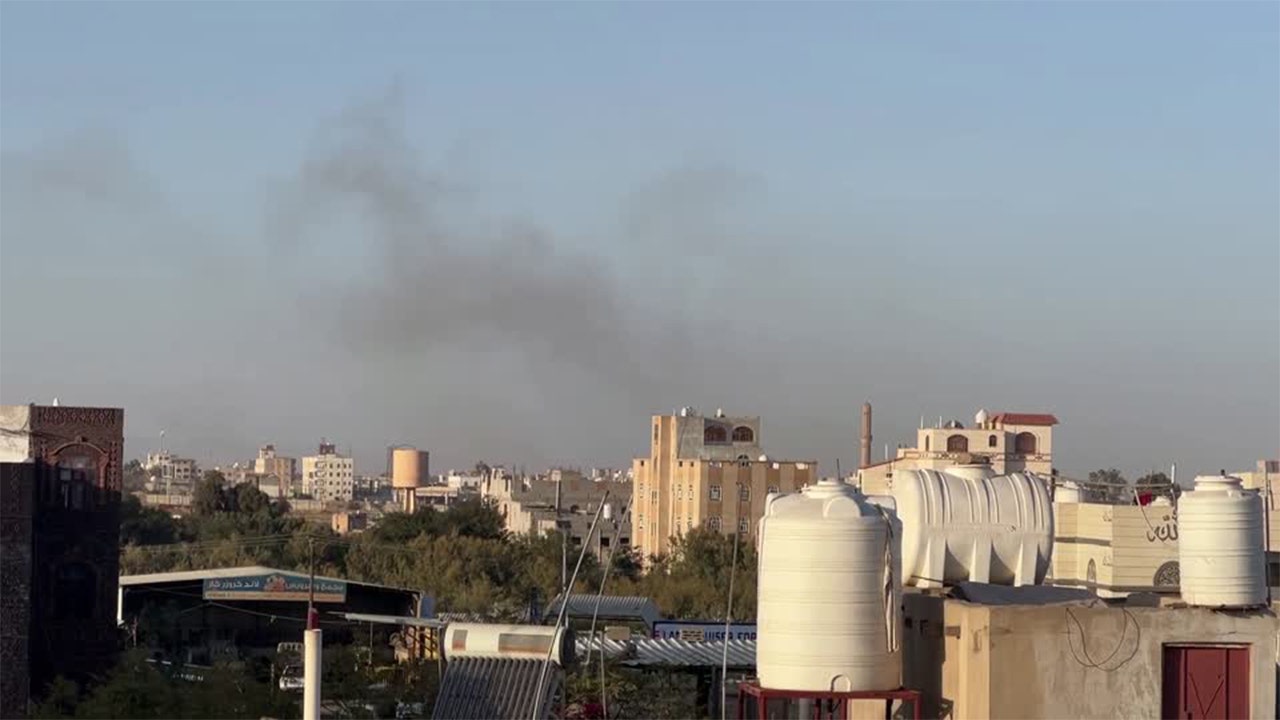
The Israeli military claimed responsibility for a series of airstrikes in Yemen on Thursday that hit Sana’a International Airport and other targets in the Houthi-controlled capital.
The Israel Defense Forces said the strikes targeted military infrastructure used by the Houthis to conduct acts of terrorism.
“The Houthi terrorist regime has repeatedly attacked the State of Israel and its citizens, including in UAV and surface-to-surface missile attacks on Israeli territory,” the IDF said in a statement.
“The targets that were struck by the IDF include military infrastructure used by the Houthi terrorist regime for its military activities in both the Sana’a International Airport and the Hezyaz and Ras Kanatib power stations. In addition, the IDF struck military infrastructure in the Al-Hudaydah, Salif, and Ras Kanatib ports on the western coast.”
PROJECTILE FROM YEMEN STRIKES NEAR TEL AVIV, INJURING MORE THAN A DOZEN: OFFICIALS
Black smoke rises near Sana’a International Airport in Yemen after reported Israeli airstrikes. (Reuters)
The strikes come days after Israel’s defense minister promised retaliation against Houthi leaders for missile strikes launched at Israel from Yemen.
Houthi rebels, who control most of northern Yemen, have fired upon Israel for more than a year to support Hamas terrorists at war with the Jewish State. The Houthis have attempted to enforce an embargo on Israel by launching missiles and drones at cargo vessels crossing the Red Sea – a major shipping lane for international trade.
US NAVY SHIPS REPEL ATTACK FROM HOUTHIS IN GULF OF ADEN
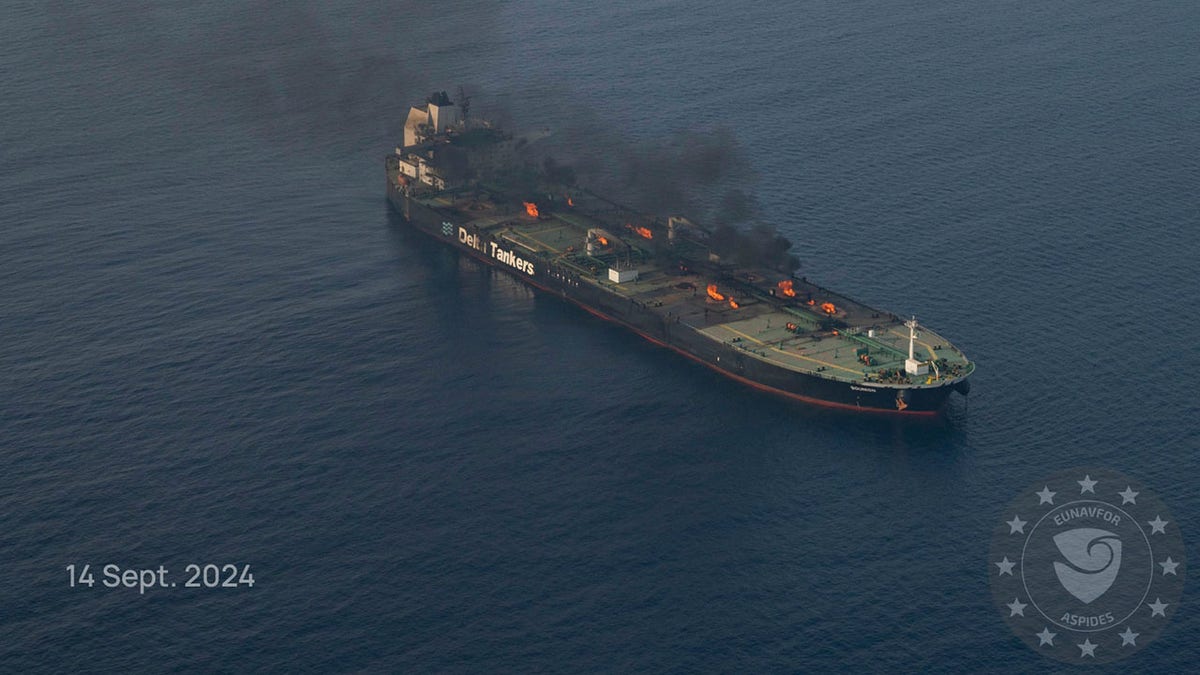
This photo released by the European Union’s Operation Aspides naval force shows the oil tanker Sounion burning in the Red Sea following a series of attacks by Yemen’s Houthi rebels, on Saturday Sept. 14, 2024. (European Union’s Operation Aspides via AP)
Overall, the Houthis have launched over 200 missiles and 170 drones at Israel since Hamas’s Oct. 7, 2023, massacre of 1,200 people. Since then, the Houthis have also attacked more than six dozen commercial vessels – particularly in the Bab-el-Mandeb, the southern maritime gateway to Egypt’s Suez Canal.
On Saturday, a projectile launched into Israel from Yemen struck Tel Aviv and caused mild injuries to 16 people, Israeli officials said. The incident was a rare occasion where Israeli defense systems failed to intercept an attack.
NETANYAHU WARNS HOUTHIS AMID CALLS FOR ISREAL TO WIPE OUT TERROR LEADERSHIP AS IT DID WITH NASRALLAH, SINWAR
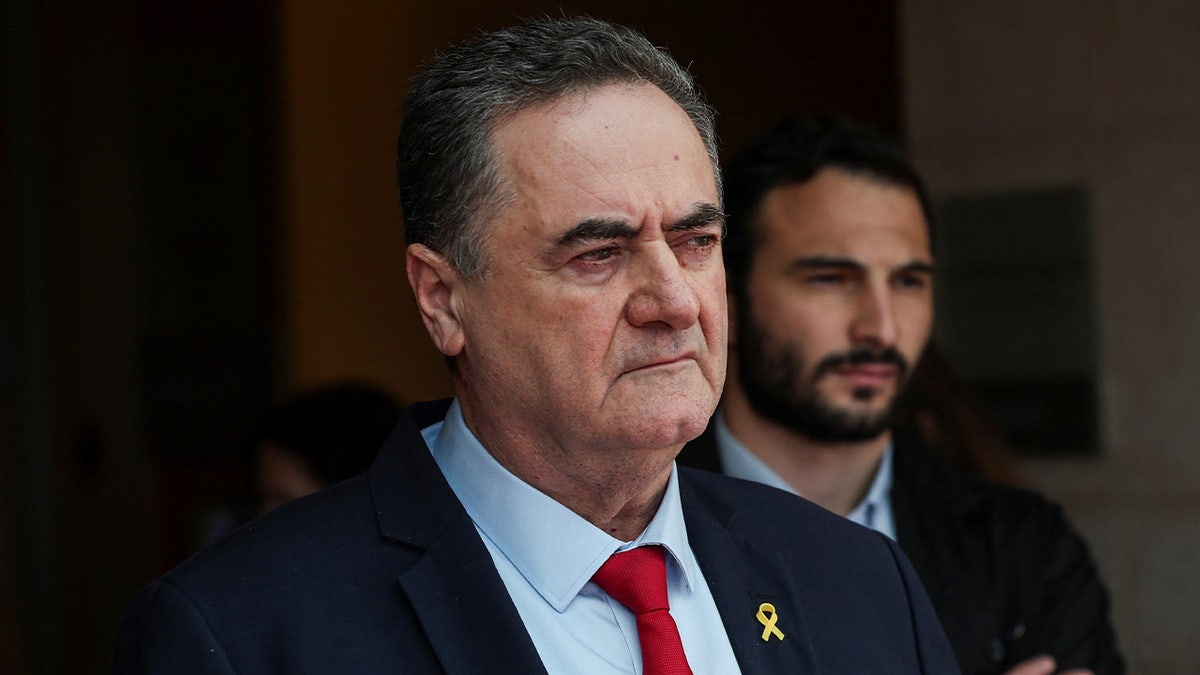
Israeli Defense Minister Israel Katz looks on, amid the ongoing conflict in Gaza between Israel and Hamas, in Jerusalem, November 7, 2024. (REUTERS/Ronen Zvulun)
Israel retaliated by striking multiple targets in areas of Yemen under Houthi control, including power plants in Sana’a.
Israeli leaders have vowed to eliminate Houthi leadership if the missile and drone attacks do not cease.
On Monday, Israeli Defense Minister Israel Katz said, “We will strike their strategic infrastructure and decapitate their leaders. Just as we did to [former Hamas chief Ismail] Haniyeh, Sinwar and Nasrallah, in Tehran, Gaza and Lebanon – we will do in Hodeidah and Sanaa.”
Prime Minister Benjamin Netanyahu has also urged Israelis to be “patient” and suggested that soon the military will ramp up its campaign against the Houthis.
“We will take forceful, determined and sophisticated action. Even if it takes time, the result will be the same,” he said. “Just as we have acted forcefully against the terror arms of Iran’s axis of evil, so too will we act against the Houthis.”
Fox News Digital’s Amelie Botbol contributed to this report.
-
/cdn.vox-cdn.com/uploads/chorus_asset/file/24924653/236780_Google_AntiTrust_Trial_Custom_Art_CVirginia__0003_1.png)
/cdn.vox-cdn.com/uploads/chorus_asset/file/24924653/236780_Google_AntiTrust_Trial_Custom_Art_CVirginia__0003_1.png) Technology6 days ago
Technology6 days agoGoogle’s counteroffer to the government trying to break it up is unbundling Android apps
-

 News7 days ago
News7 days agoNovo Nordisk shares tumble as weight-loss drug trial data disappoints
-

 Politics7 days ago
Politics7 days agoIllegal immigrant sexually abused child in the U.S. after being removed from the country five times
-

 Entertainment1 week ago
Entertainment1 week ago'It's a little holiday gift': Inside the Weeknd's free Santa Monica show for his biggest fans
-

 Lifestyle1 week ago
Lifestyle1 week agoThink you can't dance? Get up and try these tips in our comic. We dare you!
-
/cdn.vox-cdn.com/uploads/chorus_asset/file/25672934/Metaphor_Key_Art_Horizontal.png)
/cdn.vox-cdn.com/uploads/chorus_asset/file/25672934/Metaphor_Key_Art_Horizontal.png) Technology2 days ago
Technology2 days agoThere’s a reason Metaphor: ReFantanzio’s battle music sounds as cool as it does
-

 Technology1 week ago
Technology1 week agoFox News AI Newsletter: OpenAI responds to Elon Musk's lawsuit
-

 News3 days ago
News3 days agoFrance’s new premier selects Eric Lombard as finance minister
